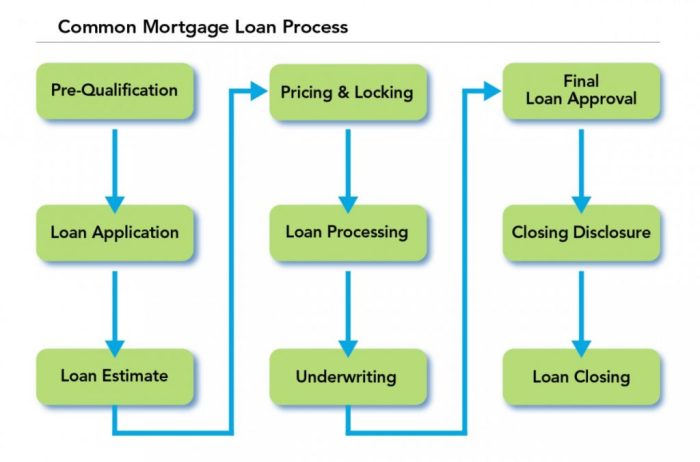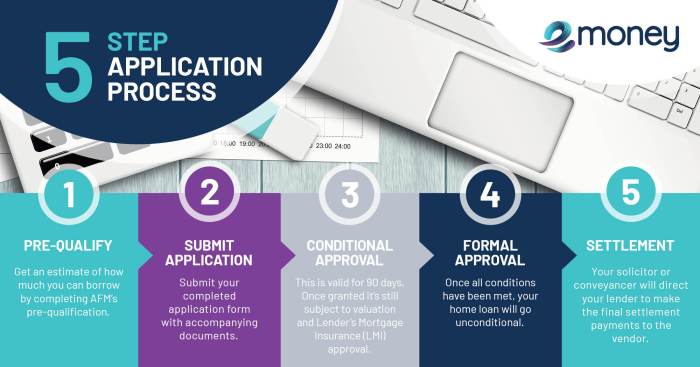Embark on the journey of understanding the loan approval process, where each step is a crucial piece in the puzzle of financial stability and growth. From documentation requirements to credit scores, unravel the secrets to unlocking your loan approval success.
Get ready to dive deep into the world of loan approvals, where knowledge is power and preparation is key to securing your financial future.
Loan Approval Process Overview
When applying for a loan, there are several key stages involved in the approval process that borrowers should be aware of. From submitting an application to receiving a final decision, the loan approval process can vary in duration depending on the type of loan and the lender’s requirements.
Key Stages in Loan Approval
- Application: The first step is to submit a loan application, which includes personal information, financial details, and the purpose of the loan.
- Review: Lenders will review the application, checking credit history, income verification, and other documentation provided by the borrower.
- Approval or Denial: After reviewing the application, the lender will make a decision to approve or deny the loan based on the borrower’s creditworthiness and financial situation.
- Underwriting: If the loan is approved, it will go through underwriting where the lender assesses the risk and finalizes the terms of the loan.
- Closing: Once the loan is underwritten, the borrower will sign the loan documents, and the funds will be disbursed.
General Timeline
While the timeline for loan approval can vary, on average, the process can take anywhere from a few days to a few weeks. Factors that may impact the timeline include the complexity of the loan, the lender’s workload, and the responsiveness of the borrower in providing required documentation.
Documentation Required

When applying for a loan, there are several important documents that you need to provide to the lender. These documents play a crucial role in the approval process and help the lender assess your financial situation and creditworthiness.
Common Documents Needed for a Loan Approval
- Proof of Income: This includes recent pay stubs, tax returns, and W-2 forms. Lenders need to verify that you have a stable income to ensure you can repay the loan.
- Identification: A valid government-issued ID such as a driver’s license or passport is required to confirm your identity.
- Credit Report: Lenders will pull your credit report to evaluate your credit history and score, which influences the terms of the loan.
- Bank Statements: Providing bank statements helps lenders see your financial habits, including your savings and spending patterns.
- Proof of Assets: Documentation of any assets like real estate, vehicles, or investments can strengthen your application.
Importance of Each Document in the Approval Process
- Proof of Income: Demonstrates your ability to repay the loan and determines your debt-to-income ratio.
- Identification: Confirms your identity and prevents fraud in the lending process.
- Credit Report: Evaluates your creditworthiness and helps determine the interest rate and loan amount.
- Bank Statements: Provides insight into your financial stability and management.
- Proof of Assets: Offers additional security for the lender and can improve your chances of approval.
Impact of Missing Documents on Approval Timeline
Missing any of the required documents can significantly delay the loan approval process. Lenders rely on these documents to make informed decisions, and without them, they may need to request additional information, leading to delays in processing your application. It is essential to ensure you have all the necessary documentation ready when applying for a loan to expedite the approval timeline.
Credit Score and Approval
When it comes to getting approved for a loan, your credit score plays a crucial role in the decision-making process. Lenders use your credit score to assess your creditworthiness and determine the level of risk involved in lending you money.
Impact of Different Credit Scores
Having a good credit score significantly increases your chances of getting approved for a loan. A higher credit score indicates to lenders that you are more likely to make timely payments and manage your finances responsibly. On the other hand, a low credit score may result in either a loan denial or approval with higher interest rates and stricter terms.
- Lenders typically consider a credit score above 700 as good, while scores below 600 are usually considered poor.
- A credit score between 600 and 700 may still get you approved for a loan, but you might face higher interest rates.
- If your credit score is below 600, focus on improving it before applying for a loan to increase your approval odds.
Remember, a good credit score not only improves your chances of loan approval but also helps you secure better terms and interest rates.
Tips to Improve Credit Score
Improving your credit score can take time, but it is essential for enhancing your approval chances for future loans. Here are some tips to help you boost your credit score:
- Pay your bills on time to avoid late payments and improve your payment history.
- Keep your credit card balances low and aim to use less than 30% of your available credit limit.
- Avoid opening multiple new credit accounts within a short period as it can negatively impact your credit score.
- Regularly check your credit report for errors and dispute any inaccuracies to maintain an accurate credit profile.
Income Verification: Loan Approval Process

Income verification is a crucial step in the loan approval process as it helps lenders assess the borrower’s ability to repay the loan. Lenders use various methods to verify income to ensure the accuracy of the information provided by the borrower.
Methods of Income Verification
- Pay Stubs: Lenders often require borrowers to submit recent pay stubs to verify their income. These documents provide details of the borrower’s earnings and help lenders assess their financial stability.
- Tax Returns: Borrowers may also be asked to provide their tax returns for the past few years. Tax returns offer a comprehensive view of the borrower’s income and can help verify the information provided in other documents.
- Bank Statements: Lenders may review the borrower’s bank statements to verify their income deposits and expenses. This helps lenders confirm the consistency of income and assess the borrower’s financial habits.
Importance of Accurate Income Verification
Accurate income verification is crucial for loan approval as it ensures that borrowers can afford to repay the loan. By verifying income through multiple sources, lenders reduce the risk of default and make informed decisions about the borrower’s financial stability. Additionally, accurate income verification helps prevent fraud and ensures that the loan terms are suitable for the borrower’s financial situation.
Loan Application Review
When lenders review loan applications, they carefully assess various factors to determine the applicant’s creditworthiness and ability to repay the loan. This process involves analyzing the documentation provided, evaluating the applicant’s credit score, and verifying income details.
Factors Influencing Decision
- Credit History: Lenders consider the applicant’s credit history to assess their past repayment behavior and financial responsibility.
- Debt-to-Income Ratio: The ratio of the applicant’s total monthly debt payments to their gross monthly income is crucial in determining their ability to manage additional debt.
- Employment Stability: Lenders look at the applicant’s employment history and stability to gauge their income reliability.
- Collateral: If the loan is secured, lenders evaluate the value of the collateral offered by the applicant to mitigate the risk of default.
Underwriting Process
The underwriting process plays a vital role in loan approval, where underwriters assess the applicant’s overall financial situation and determine the level of risk associated with granting the loan. They carefully review all the information provided, analyze the applicant’s creditworthiness, and ensure that the loan meets the lender’s criteria for approval.
Loan Approval Criteria
When it comes to loan approval, lenders consider several key criteria to determine whether an applicant qualifies for a loan. These criteria help lenders assess the risk associated with lending money to an individual and ensure that the borrower has the ability to repay the loan.
Debt-to-Income Ratio
The debt-to-income ratio is a crucial factor that lenders consider when evaluating a loan application. This ratio compares the amount of debt a borrower has to their income. A lower debt-to-income ratio indicates that a borrower has more income available to cover their monthly loan payments, making them less risky to lend to.
A lower debt-to-income ratio is generally preferred by lenders, as it shows that the borrower is more likely to be able to repay the loan.
Meeting Criteria for Speedy Approval, Loan approval process
Meeting the key criteria set by lenders can significantly speed up the approval process for a loan. By having a strong credit score, sufficient income to cover monthly payments, and a low debt-to-income ratio, borrowers demonstrate their financial stability and ability to repay the loan. This reduces the risk for lenders and increases the likelihood of approval.





